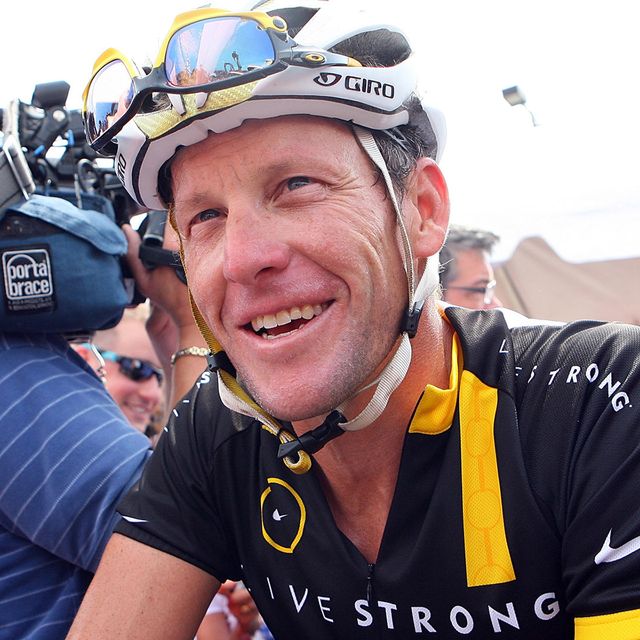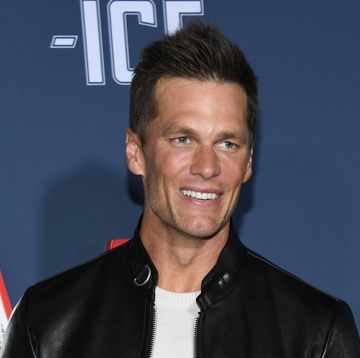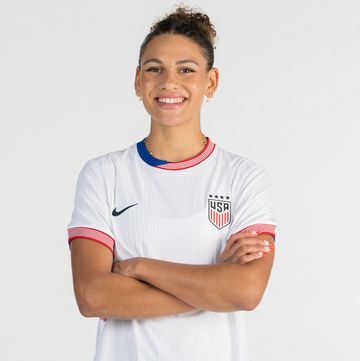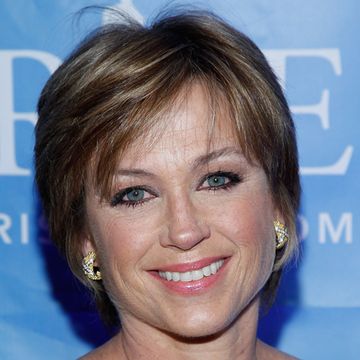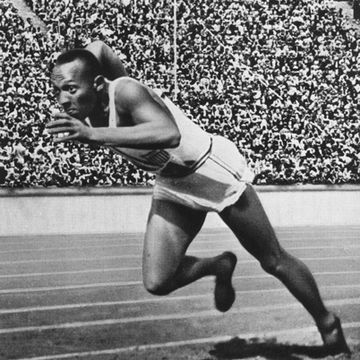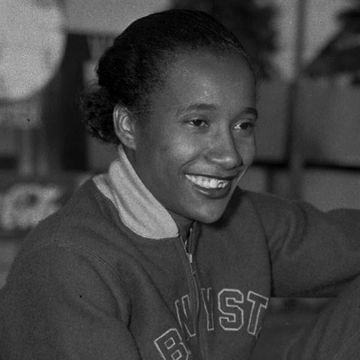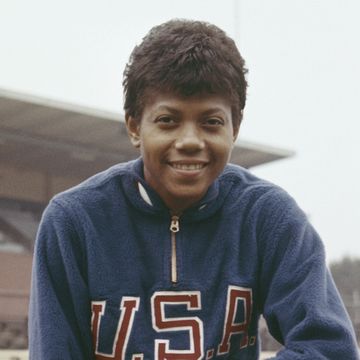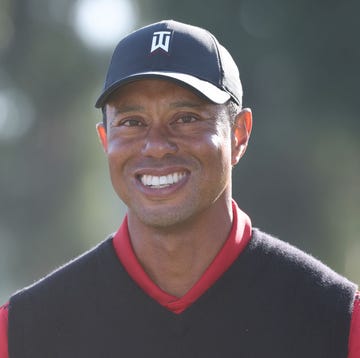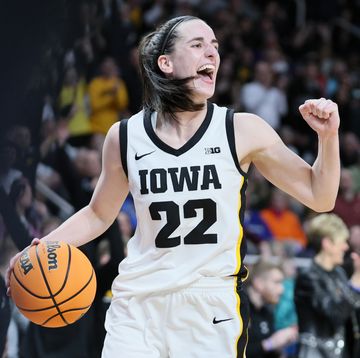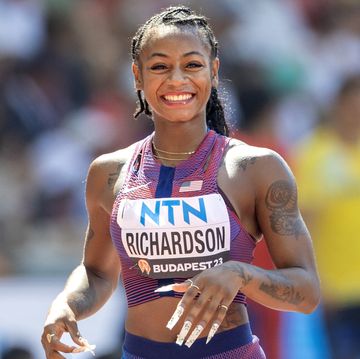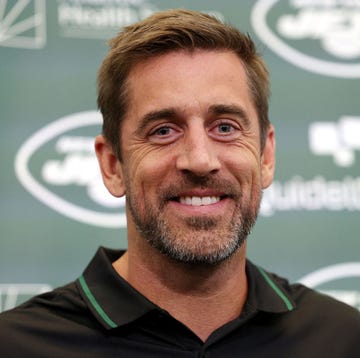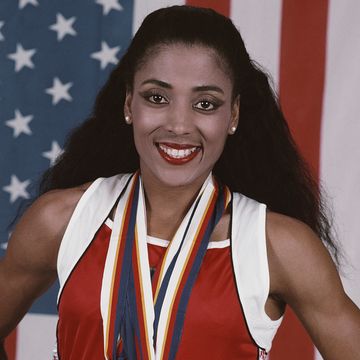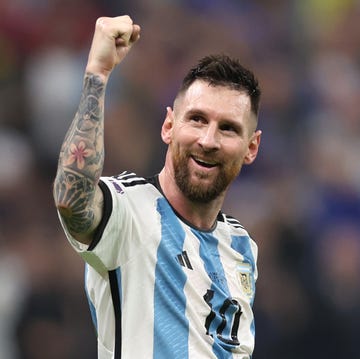(1971-)
Who Is Lance Armstrong?
Lance Armstrong became a triathlete before turning to professional cycling. His career was halted by testicular cancer, but Armstrong returned to win a record seven consecutive Tour de France races beginning in 1999. Stripped of those titles in 2012 due to evidence of performance-enhancing drug use, Armstrong in 2013 admitted to doping throughout his cycling career, following years of denials.
Early Career
Born on September 18, 1971, in Plano, Texas, Armstrong was raised by his mother, Linda, in the suburbs of Dallas, Texas. Armstrong was athletic from an early age. He began running and swimming at 10 years old, and took up competitive cycling and triathlons at 13. At 16, Armstrong became a professional triathlete—he was the national sprint-course triathlon champion in 1989 and 1990.
Soon after, Armstrong chose to focus on cycling, his strongest event as well as his favorite. During his senior year of high school, the U.S. Olympic development team invited him to train in Colorado Springs, Colorado. Armstrong left high school temporarily to do so, but later took private classes and received his high school diploma in 1989.
The following summer, he qualified for the 1990 junior world team and placed 11th in the World Championship Road Race, with the best time of any American since 1976. That same year, he became the U.S. national amateur champion and beat out many professional cyclists to win two major races, the First Union Grand Prix and the Thrift Drug Classic.
International Cycling Star
In 1991, Armstrong competed in his first Tour DuPont, a long and difficult 12-stage race, covering 1,085 miles over 11 days. Though he finished in the middle of the pack, his performance announced a promising newcomer to the world of international cycling. He went on to win a stage at Italy's Settimana Bergamasca race later that summer.
After finishing second in the U.S. Olympic time trials in 1992, Armstrong was favored to win the road race in Barcelona, Spain. With a surprisingly sluggish performance, however, he came in only 14th. Undeterred, Armstrong turned professional immediately after the Olympics, joining the Motorola cycling team for a respectable yearly salary. Though he came in dead last in his first professional event, the day-long San Sebastian Classic in Spain, he rebounded in two weeks and finished second in a World Cup race in Zurich, Switzerland.
Armstrong had a strong year in 1993, winning cycling's "Triple Crown"—the Thrift Drug Classic, the Kmart West Virginia Classic and the CoreStates Race (the U.S. Professional Championship). That same year, he came in second at the Tour DuPont. He started off well in his first-ever Tour de France, a 21-stage race that is widely considered cycling's most prestigious event. Though he won the eighth stage of the race, he later fell to 62nd place and eventually pulled out.
In August 1993, the 21-year-old Armstrong won his most important race yet: the World Road Race Championship in Oslo, Norway, a one-day event covering 161 miles. As the leader of the Motorola team, he overcame difficult conditions—pouring rain made the roads slick and caused him to crash twice during the race—to become the youngest person and only the second American ever to win that contest.
The following year, he was again the runner-up at the Tour DuPont. Frustrated by his near miss, he trained with a vengeance for the next year's event and went on to finish two minutes ahead of rival Viatcheslav Ekimov of Russia for the win. At the Tour DuPont in 1996, he set several event records, including the largest margin of victory (three minutes, 15 seconds) and the fastest average speed in a time trial (32.9 miles per hour).
Also in 1996, Armstrong rode again for the Olympic team in Atlanta, Georgia. Looking uncharacteristically fatigued, he finished sixth in the time trials and 12th in the road race. Earlier that summer, he had been unable to finish the Tour de France, as he was sick with bronchitis. Despite such setbacks, Armstrong was still riding high by the fall of 1996. Then the seventh-ranked cyclist in the world, he signed a lucrative contract with a new team, France's Team Cofidis.
Battling Testicular Cancer
In October 1996, however, came the shocking announcement that Armstrong had been diagnosed with testicular cancer. Well advanced, the tumors had spread to his abdomen, lungs and lymph nodes. After having a testicle removed, drastically modifying his eating habits and beginning aggressive chemotherapy, Armstrong was given a 65 to 85 percent chance of survival. When doctors found tumors on his brain, however, his odds of survival dropped to 50-50, and then to 40 percent. Fortunately, a subsequent surgery to remove his brain tumors was declared successful, and after more rounds of chemotherapy, Armstrong was declared cancer-free in February 1997.
Throughout his terrifying struggle with the disease, Armstrong continued to maintain that he was going to race competitively again. No one else seemed to believe in him, however, and Cofidis pulled the plug on his contract and $600,000 annual salary. As a free agent, he had a good deal of trouble finding a sponsor, finally signing on to a $200,000-per-year position with the United States Postal Service team.
Tour de France Dominance
At the 1998 Tour of Luxembourg, his first international race since returning from cancer, Armstrong showed he was up for the challenge by winning the opening stage. A little over a year later, he capped his comeback in grand style by becoming the second American, after Greg LeMond, to win the Tour de France. He repeated that feat in July 2000 and followed with a bronze medal at the Summer Olympic Games.
Armstrong bolstered his legacy as his generation's dominant rider by handily winning the Tour in 2001 and 2002. However, notching a fifth victory, tying the record held by Jacques Anquetil, Eddy Merckx, Bernard Hinault and Miguel Indurain, proved his most difficult accomplishment. Stricken by illness before the start of the race, Armstrong fell at one point after snagging a spectator's bag, and barely avoided another crash by swerving across a field. He finished one minute and one second ahead of Germany's Jan Ullrich, the closest of his Tour triumphs.
Armstrong was back in top form to claim his record-breaking sixth Tour win in 2004. He won five individual stages, finishing a comfortable six minutes and 19 seconds ahead of Germany's Andreas Kloden. After capping his astounding run with a seventh consecutive Tour victory in 2005, he retired from racing.
Return to Competition
On September 9, 2008, Armstrong announced that he planned to return to competition and the Tour de France in 2009. A member of Team Astana, he placed third in the race, behind teammate Alberto Contador and Saxo Bank team member Andy Schleck.
After the race, Armstrong told reporters that he intended to compete again in 2010, with a new team endorsed by RadioShack. Slowed by multiple crashes, Armstrong finished 23rd overall in what would be his final Tour de France, and he announced he was retiring for good in February 2011.
Drug Controversy
Despite the inspiring narrative of Armstrong's triumph over cancer, not everyone was convinced it was valid. Irish sportswriter David Walsh, for one, became suspicious of Armstrong's behavior and sought to shed light on the rumors of drug use in the sport. In 2001, he wrote a story linking Armstrong to Italian doctor Michele Ferrari, who was being investigated for supplying performance enhancers to cyclists. Walsh later secured a confession from Armstrong's masseuse, Emma O'Reilly, and laid out his case against the American champion as co-writer of the 2004 book L.A. Confidential.
The plot thickened in 2010, when former U.S. Postal rider Floyd Landis, who had been stripped of his 2006 Tour de France win for drug use, admitted to doping and accused his celebrated teammate of doing the same. That prompted a federal investigation, and in June 2012 the U.S Anti-Doping Agency brought formal charges against Armstrong. The case heated up in July 2012, when some media outlets reported that five of Armstrong's former teammates, George Hincapie, Levi Leipheimer, David Zabriskie and Christian Vande Velde—all of whom participated in the 2012 Tour de France—were planning to testify against Armstrong.
The cycling champion vehemently denied using illegal drugs to boost his performance, and the 2012 USADA charges were no exception: He disparaged the new allegations, calling them "baseless." On August 23, 2012, Armstrong publicly announced that he was giving up his fight with the USADA's recent charges and that he had declined to enter arbitration with the agency because he was tired of dealing with the case, along with the stress the case created for his family.
"There comes a point in every man's life when he has to say, 'Enough is enough.' For me, that time is now," Armstrong said in an online statement around that time. "I have been dealing with claims that I cheated and had an unfair advantage in winning my seven Tours since 1999. The toll this has taken on my family and my work for our foundation and on me leads me to where I am today—finished with this nonsense."
Banned From Cycling
The following day, on August 24, 2012, the USADA announced that Armstrong would be stripped of his seven Tour titles—as well as other honors he received from 1999 to 2005—and banned from cycling for life. The agency concluded in its report that Armstrong had used banned performance-enhancing substances. On October 10, 2012, the USADA released its evidence against Armstrong, which included documents such as laboratory tests, emails and monetary payments. "The evidence shows beyond any doubt that the U.S. Postal Service Pro Cycling Team ran the most sophisticated, professionalized and successful doping program that the sport had ever seen," Travis Tygart, chief executive of the USADA, said in a statement.
The USADA evidence against Armstrong also contained testimony from 26 people. Several former members of Armstrong's cycling team were among those who claimed that Armstrong used performance-enhancing drugs and served as a type of a ringleader for the team's doping efforts. According to The New York Times, one teammate told the agency that "Lance called the shots on the team" and "what Lance said went."
Armstrong disputed the USADA's findings. His attorney, Tim Herman, called the USADA's case "a one-sided hatchet job" featuring "old, disproved, unreliable allegations based largely on axe-grinders, serial perjurers, coerced testimony, sweetheart deals and threat-induced stories," according to USA Today.
Shortly after the release of the USADA findings, the International Cycling Union (cycling's governing body) supported the USADA's decision and officially stripped Armstrong of his seven Tour de France victories. The union also banned Armstrong from the sport for life. ICU president Pat McQuaid said in a statement that "Lance Armstrong has no place in cycling."
Admission and Later Events
In January 2013, during a televised interview with Oprah Winfrey, Armstrong admitted to using performance-enhancing drugs throughout his career, beginning in the mid-1990s. During his interview with Winfrey, Armstrong stated that he took the hormones cortisone, testosterone and erythropoietin (also known as EPO), and conducted blood transfusions to boost his oxygen levels. "I am deeply flawed ... and I'm paying the price for it, and I think that's OK. I deserve this," Lance stated during the interview, adding that he took illegal drugs as a professional athlete due to a "ruthless desire to win ... the level that it went to, for whatever reason, is a flaw."
Of the interview, Winfrey said in a statement, "He did not come clean in the manner I expected. It was surprising to me. I would say that, for myself, my team, all of us in the room, we were mesmerized by some of his answers. I felt he was thorough. He was serious. He certainly prepared himself for this moment. I would say he met the moment. At the end of it, we both were pretty exhausted."
Around the same time that the interview was conducted, it was reported that the U.S. Department of Justice would join a lawsuit already in place against the cyclist, over his alleged fraud against the government. Armstrong's attempts to have the lawsuit dismissed were rejected, and in early 2017 the case was allowed to proceed to trial.
Fraud Settlement
In spring 2018, two weeks before his trial was scheduled to begin, Armstrong agreed to pay the U.S. Postal Service $5 million to settle their claims of being defrauded. According to his legal team, the settlement ended "all litigation against Armstrong related to his 2013 admission" of using performance-enhancing drugs.
"I am particularly glad to have made peace with the Postal Service," said Armstrong said in a statement. "While I believe that their lawsuit against me was without merit and unfair, I have since 2013 tried to take full responsibility for my mistakes, and make amends wherever possible. I rode my heart out for the Postal cycling team, and was always especially proud to wear the red, white and blue eagle on my chest when competing in the Tour de France."
Landis, the whistle-blower in the case, stood to receive $1.1 million of the amount paid to the government. Additionally, Armstrong agreed to shell out $1.65 million to cover his old teammate's legal expenses.
Movie and Documentaries
In 2015, the Armstrong biopic The Program, with Ben Foster portraying the fallen cyclist, premiered at the Toronto Film Festival. Armstrong had little to say about the film, other than criticizing its star for taking performance-enhancing drugs to prepare for the role.
Armstrong was far more receptive to the release of Icarus, a Netflix documentary in which amateur cyclist Bryan Fogel also pumps up on PEDs before uncovering a Russian state-sponsored system created to mask its athletes' use of such drugs. In late 2017, Armstrong tweeted: "After being asked roughly a 1000 times if I’ve seen @IcarusNetflix yet, I finally sat down to check it out. Holy hell. It’s hard to imagine that I could be blown away by much in that realm but I was. Incredible work @bryanfogel!"
It was subsequently announced that on January 6, 2018, the day after Academy Award voters could begin submitting their ballots, Armstrong would co-host a screening and reception for Icarus in New York.
The cyclist returned to the spotlight with the Marina Zenovich-directed documentary Lance, which premiered at the January 2020 Sundance Film Festival before airing on ESPN that May. Along with examining the formative influences that drove him to become such a ruthless competitor, the doc showcased Armstrong's attempts to adapt to public life in the years after he had fallen from his pedestal as one of the world's most admired athletes.
Charity, Personal Life and Children
Armstrong has lived in Austin, Texas, since 1990. In 1996, he founded the Lance Armstrong Foundation for Cancer, now called LiveStrong, and the Lance Armstrong Junior Race Series to help promote cycling and racing among America's youth. He is the author of two best-selling autobiographies, It's Not About the Bike: My Journey Back to Life (2000) and Every Second Counts (2003).
In 2006, Armstrong ran the New York City Marathon, raising $600,000 for his LiveStrong campaign. He stepped down from LiveStrong in October 2012 following the USADA report about his use of performance-enhancing drugs.
Armstrong married Kristin Richard, a public relations executive he met through his cancer foundation, in 1998. The couple had a son, Luke, in October 1999, using sperm frozen before Armstrong began chemotherapy. Twin daughters, Isabelle and Grace, were born in 2001. The couple filed for divorce in 2003. Afterward, he dated rocker Sheryl Crow, fashion designer Tory Burch and actresses Kate Hudson and Ashley Olsen.
In December 2008, Armstrong announced that his girlfriend, Anna Hansen, was pregnant with his child. The couple had been dating since July after meeting through Armstrong's charity work. The baby boy, Maxwell Edward, was born on June 4, 2009. A daughter, Olivia Marie, followed on October 18, 2010.
In July 2013, Armstrong made headlines again when it was reported that he would be competing in The Des Moines Register's Annual Great Bicycle Ride Across Iowa, a statewide cycling race sponsored by the newspaper.
"I'm well aware my presence is not an easy topic, and so I encourage people if they want to give a high-five, great," Armstrong stated shortly after the news broke, according to the Daily Mail. "If you want to shoot me the bird, that's OK too. I'm a big boy, and so I made the bed, I get to sleep in it."
In 2015, Armstrong returned to the Tour de France course to ride in a leukemia charity event one day before the start of the race.
QUICK FACTS
- Name: Lance Armstrong
- Birth Year: 1971
- Birth date: September 18, 1971
- Birth State: Texas
- Birth City: Plano
- Birth Country: United States
- Gender: Male
- Best Known For: Lance Armstrong is a cancer survivor and former professional cyclist who was stripped of his seven Tour de France wins due to evidence of performance-enhancing drug use.
- Industries
- Sports
- Astrological Sign: Virgo
Fact Check
We strive for accuracy and fairness.If you see something that doesn't look right,contact us!
CITATION INFORMATION
- Article Title: Lance Armstrong Biography
- Author: Biography.com Editors
- Website Name: The Biography.com website
- Url: https://www.biography.com/athletes/lance-armstrong
- Access Date:
- Publisher: A&E; Television Networks
- Last Updated: April 23, 2021
- Original Published Date: April 2, 2014
QUOTES
- There comes a point in every man's life when he has to say, 'Enough is enough.' For me, that time is now.
- My ruthless desire to win at all costs served me well on the bike but the level it went to, for whatever reason, is a flaw. That desire, that attitude, that arrogance.
- The biggest challenge of the rest of my life is to not slip up again and not lose sight of what I have to do. I had it but things got too big and too crazy.
- If you're trying to hide something, you wouldn't keep getting away with it for 10 years. Nobody is that clever.
- I know the truth. The truth isn't what was out there. The truth isn't what I said, and now it's gone—this story was so perfect for so long.
- There was more happiness in the process, in the build, in the preparation. The winning was almost phoned in.
- If you're asking me if I want to compete again, the answer is hell yes, I'm a competitor.
- I learned a lesson that day. No more gifts."[On giving Marco Pantani a stage win in the 2000 Tour de France]
- The Look was just one part of a great battle with the Telekom team all day.
- Nobody believed I was able to do that after the crash. But I was a desperate man, and I knew that was my last chance to win the Tour de France.
- I'm well aware my presence is not an easy topic, and so I encourage people if they want to give a high-five, great. If you want to shoot me the bird, that's OK too. I'm a big boy, and so I made the bed, I get to sleep in it.
- I am deeply flawed ... and I'm paying the price for it, and I think that's okay. I deserve this."[On being stripped of his seven Tour de France titles for doping as a pro cyclist.]
- Two things scare me: The first is getting hurt. But that's not nearly as scary as the second, which is losing.
- Pain is temporary. It may last a minute, or an hour, or a day, or a year, but eventually it will subside and something else will take its place. If I quit, however, it lasts forever.
